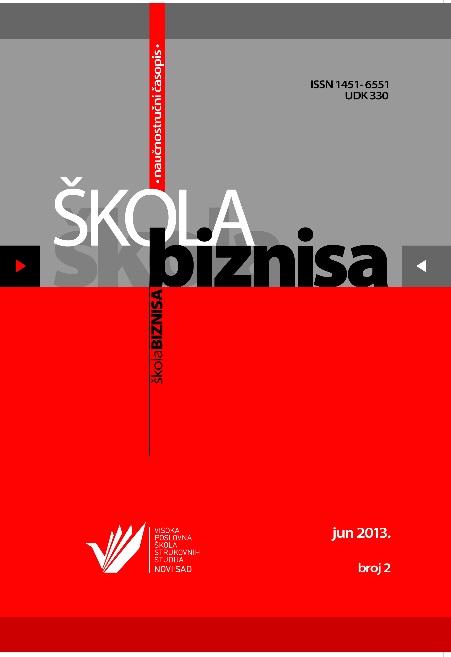PREDNOSTI ČLANSTVA U EVROPSKOJ MONETARNOJ UNIJI I UTICAJ NA TRGOVINU U EVROZONI
Abstract
Evropska monetarna unija je od velikog značaja, s obzirom da podrazumeva integrisanje velikog broja država koje članstvom u uniji ostvaruju niz prednosti. Jedna od prednosti je smanjenje transakcionih troškova usled eliminisanja potrebe za konverzijom valuta. Manji transakcioni troškovi čine mnogo lakšom i profitabilnijom trgovinu između zemalja članica Evropske monetarne unije. Najzapaženije dostignuće Evropske monetarne unije je jedinstvena valuta- evro koja se danas sve više koristi u međunarodnoj trgovini. Eliminacija rizika deviznog kursa je značajna prednost s obzirom da utiče na jačanje unutrašnjeg tržišta i smanjenje rizika investiranja. Transparentnost cena u trgovini između država članica i unutar država članica dovodi do homogenizacije cena u EU. U radu se akcenat stavlja na prednosti koje se obezbeđuju članstvom u Evropskoj monetarnoj uniji, sa posebnim osvrtom na uticaj na trgovinu u Evrozoni.
References
Beetsma, R., & Giuliodori, M. (2010). The Macroeconomic Costs and Benefits of the EMU and Other Monetary Unions: An Overview of Recent Research. Journal of Economic Literature, 48(3), 603-641.
Bukowski, S.I. (2011). Economic and Monetary Union–current fiscal disturbances and the future. International Advances in Economic Research, 17(3), 274-287.
Cooper, L., & Tomic, A. (2007). European monetary union (EMU) and the single currency: its current status. Journal of International Business Research, 6(2), 59-68.
De Grauwe, P. (2010). The Greek crisis and the future of the eurozone. Intereconomics, 89-93.
Dunn, R. (1999). An easy monetary policy in the European union. Challenge, 42(4), 29 - 43.
Džombić, I. (2010). Evropska unija - prošlost, sadašnjost, budućnost. Sarajevo: Friedrich- Ebert-Stiftung.
Eudey, G. (1998). Why Is Europe Forming A Monetary Union. Federal Reserve Bank of Philadelphia Business Review, 13-21.
European Commission. Economic and Financial Affairs, Economic and Monetary Union. Retrieved from
http://ec.europa.eu/economy_finance/euro/emu/index_en.htm 2012 Nov 28.
European Union. Economic and monetary affairs. Retrieved from http://europa.eu/pol/emu/index_en.htm 2012 Nov 28.
Issing, O. (2011). The crisis of European Monetary Union–Lessons to be drawn. Journal of Policy Modeling, 33(5), 737-749.
Kösters, W. (2010). Challenges Facing European Monetary Union–Rules and Assignment or Discretion and Coordination. Intereconomics, 45(2), 86-89.
Kotilainen, M. (1992). The Benefits and Costs of EMU. Unitas, 64(3), 8.
Memišević, S. (2010). Monetarno okrupnjavanje na evropskom tlu- Ekonomska i monetarna unija. Sarajevo: Direkcija za evropske integracije.
Miljković, D. (2008). Međunarodne finansije. Beograd: Centar za izdavačku delatnost Ekonomskog fakulteta.
Mucha-Leszko, B., & Kakol, M. (2009). Will the financial-economic crisis of 2008-2009 accelerate monetary integration in the EU. Eurolimes, 8, 180-181.
Neu, R. (2000). European monetary union: Will it really contribute to stability. Business Economics, 35(1), 59-62.
Perry, S. (1994). European Monetary Union: What happens next. Financial Management, 72(10), 58.
Pisani-Ferry, J. (2013). The known unknowns and unknown unknowns of European Monetary Union. Journal of International Money and Finance, 34, 6-14.
Salvatore, D. (2009). Euro. Princeton University Press.
Siklos, P. (2009). European Monetary Union. Princeton University Press.
Stanek, M.B. (2001). International monetary arrangements: the European Union and the euro. European Business Review, 13(5), 279-291. doi:10.1108/EUM0000000005796
Tavlas, G. (2004). Benefits and costs of entering the eurozone. Cato Journal, 24(1-2), 89-106.
The University of North Carolina. Euro Economics, Costs and Benefits of Joining a Monetary Union. Retrieved from http://www.unc.edu/depts/europe/euroeconomics/Cost%20Benefit.php 2012 Dec 12.
The University of North Carolina. The Costs and Benefits of the Euro In European Monetary Union Countries. Retrieved from http://www.unc.edu/~salemi/Econ006/Portone_2004.pdf 2012 Dec 12.
van Veen, T. (2002). European Economic and Monetary Integration and the Euro. Australian Economic Review,35(4), 455-462. doi:10.1111/1467-8462.00262
Zirojević, M., & Jelisavac, S. (2002). Evropska monetarna unija i evro. Međunarodni problemi, 54(1-2), 99-114.
- Authors retain copyright and grant the journal right of first publication with the work simultaneously licensed under a Creative Commons Attribution License that allows others to share the work with an acknowledgement of the work's authorship and initial publication in this journal.
- Authors are able to enter into separate, additional contractual arrangements for the non-exclusive distribution of the journal's published version of the work (e.g., post it to an institutional repository or publish it in a book), with an acknowledgement of its initial publication in this journal.
- Authors are permitted and encouraged to post their work online (e.g., in institutional repositories or on their website) prior to and during the submission process, as it can lead to productive exchanges, as well as earlier and greater citation of published work (See The Effect of Open Access).

